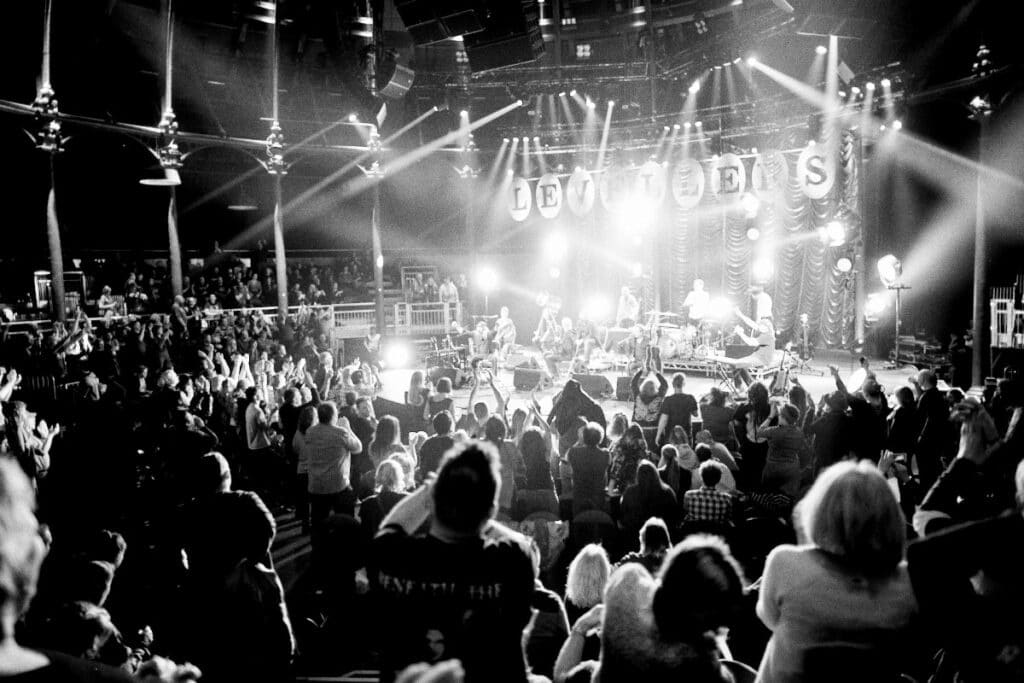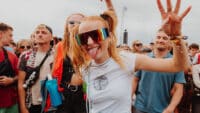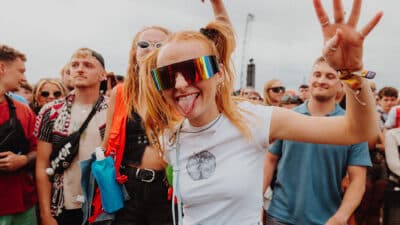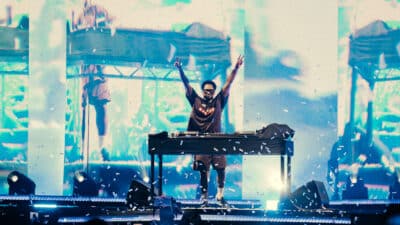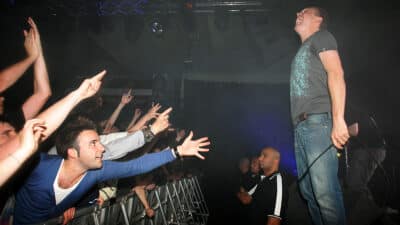Music
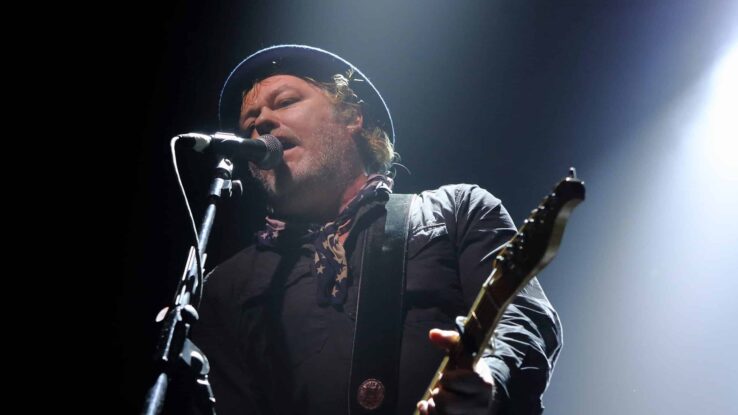
Interview
Stage Times: Mark Chadwick of Levellers
Mark Chadwick talks us through over 30 years of touring, from sweaty basements to monumental festivals
If there was ever a song that captured the arm-in-arm, frenzied folk-punk energy of the Levellers, it might be ‘Down By The River ‘O”. It’s one of the beloved Brighton band’s oldest numbers, reborn as part of their new album Together All The Way, which sees the group lean into their folky and traditional roots. It forms the second chapter to 2018’s We The Collective, and both will make up much of the band’s upcoming acoustic UK tour.
“We worked on the songs in a way that had never happened before,” frontman and founder Mark Chadwick tells us, “which is where you really focus on the actual lyrical content. The music is an atmosphere for the actual lyrics, rather than just ‘1, 2, 3, 4… Go!’ It’s a different way of approaching the songs and we get really quite musical.”
Ahead of their March tour, Chadwick took us through some of the highs and lows of Leveller’s touring career, from getting spat at by punks to garnering hitchhiking super fans on the road.
The one that made you want to play music
I went to see Queen in Germany when I was a kid, when my dad was in the army. It was around 1980 and I got to go see them at the Essen Halle, which is a big old place, and got in the front row in front of Brian May and got to watch that show. Pretty cool when you’re like 13, pretty mind blowing and, to be honest, hard to top since. They were on fire then.
The first
Our first gig was in 1988 at The Basement, which was an old venue in the art college basement, in the middle of Brighton, where Jeremy our bass player used to go. They had quite a well known venue, and it lasted for years all the way through the 70s and 80s. We had seven songs, we’d been together two weeks, and we just wanted to play live straightaway because we thought that was the best way to learn. We played all seven and the crowd was really full. I think it was a benefit gig for something, I can’t remember, but we had to play all seven again. So that was a good start [laughs].
We really built a big following in Brighton. We played like the local places, like The Richmond, as it used to be, which was the main venue. We’d sell out two nights there and have people queuing around the block. That was big news in Brighton but in those days, people would do a tour of Brighton. You know, they’d play pubs in Brighton and put a poster up saying they’re going on tour. We never thought like that, we wanted to get out of town as quickly as we possibly could. So we started playing in Sussex and then eventually up into London and from then on it started moving very quickly.
We were quite remorseless. You know, we’re very ambitious, we really work hard. Like I said, we were doing a gig within the first two weeks of forming the band, so we didn’t really know what we were doing. We didn’t have a sound as such, we didn’t have a clue. We just wrote songs and bashed them out and saw what people thought and people seemed to like the drive and energy we had.
The biggest
There’s Glastonbury ’94. That was big. I think, actually a bigger one was at Brockwell Park, I think that was the biggest one. That was an anti-racist gig that we did, and that was huge. The numbers weren’t counted, because there were so many people there it literally filled the whole park. We played with Manic Street Preachers and Billy Bragg and few others, that was a huge audience, bigger than Glastonbury. It was free and everybody went.
I think our music lends itself to those big crowds because it’s fairly catchy, people know them and even if they don’t know they know them, they know them. It’s energetic and it’s quite dynamic; we move about, we’re not static, we don’t expect people to worship at our feet, we have to work for it.
These days, there’s a lot of reliance on spectacular effects and lighting, stuff like that. It used to be that you had to be good. You had to rely on your personalities and your music and your tunes to make an audience come together. But nowadays, you can kind of blind them with sights. That’s the difference.
We had the Happy Hitchers joining us at these shows too. It was quite early on, before we got signed to a record label. There used to be this thing before the internet called word of mouth, and that’s how it spread. So people got to hear about the band and people would talk about it at other gigs and go, “You’ve got to come and see this band. Let’s go. They’re playing Peterborough tonight!” So people hitched to gigs when you could do that, so there was free transport. They’re pretty hardcore people to do it, and we ended up recruiting quite a few of them! They became our backline crew and many of them are in the profession now.
The worst
There’s been a few, to be fair, so it’s hard to pick! You can’t be going for 35 years and not have some really sh*t gigs. The first worst one was when we played up in Scotland, and the promoter, bless him, had hired a hall, he’d hired a bouncer, he’d hired a bar, he’d hired a cloak room. Everything apart from an audience. There was nobody, not one person. Two girls came in five minutes after we actually started – we thought we’d start anyway, ‘cos we might as well practice – and then walked out. That was the moment of, “Okay, this isn’t so good.”
One of the worst gigs that we ever did when we were sort of touring big style was when when we supported Rage Against The Machine and Public Enemy. We were on the same bill as them in Portland, Oregon. That was a bad bill for us to be on. There’s a lot of white jocks in the audience with baseball caps on spitting at us, ‘cos we’ve come on with mandolins and violins and they’re just going, “Off! Off!” I just stood at the front of the gig and spat at them, then walked off. We got loads of respect from Public Enemy. They were going, “F*ck off, you don’t understand what these guys are all about and what they’re singing about.”
The best
Biggest isn’t always best, do you know what I mean? It’s always just the last good one. The last good one we did was this punk rock festival up in Blackpool, R-Fest, a side festival of Rebellion. For some reason it just really rocked, you had punk rockers from all over the world, all over Eastern Europe, America, Japan and China even. We saw that those guys were serious about their kind of music, so let’s get them into this and entertain them and we’ll be winning. It’s always been the point for us, we do like to focus on the live performance and remember that we’re entertainers.
